Writing for Justice Fellowship 2018-2019
Meet the 2018-2019 Writing for Justice Fellows
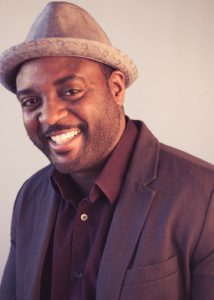
Reginald Dwayne Betts
New Haven, Connecticut
For the Fellowship, Reginald Dwayne Betts completed his collection of poems, Felon, and in collaboration with a dramaturg, translated the work into an in-development one-man show that interrogates the experience of coming home from prison.
Through the Fellowship, Betts worked with dramaturg Anu Yadav.
Felon (Norton, 2019) garnered press in The New Yorker, NPR, The New York Times Book Review, WNYC, and Poetry Foundation, among others, and was described by Carolyn Forché in The New York Times as “a powerful work of lyric art. It is also a tour de force indictment of the carceral industrial state.”
Post-Fellowship, Betts launched The Million Book Project, which will bring curated 500-book literary time-capsules to 1,000 prisons and juvenile detention centers to each state in the United States, plus Washington, D.C. and Puerto Rico, and published the stirring “Kamala Harris, Mass Incarceration and Me” in The New York Times.
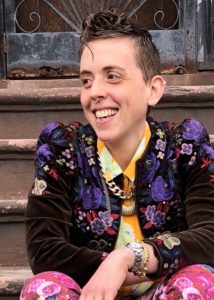
Nadja Eisenberg-Guyot
Brooklyn, New York
Nadja Eisenberg-Guyot published their Fellowship project, “New York City Has a Jail Problem” in Current Affairs, a long-form journalism piece, examining opposition to the prison reform approach represented by New York Mayor Bill de Blasio’s “Smaller, Safer, Fairer” Roadmap, which under the guise of decarceration will close Rikers Island and replace it with four “community integrated” jails.
Through the Fellowship, Eisenberg-Guyot worked with journalist and essayist Syreeta McFadden.
Post-Fellowship, Eisenberg-Guyot published the co-written op-ed “Opinion: NYC Can’t Jail Its Way Out of a Public Health Crisis” in City Limits (with Jarrod Shanahan), and “Release People From Jail to Prevent a Coronavirus Catastrophe Behind Bars” in Shadowproof (with Jose Saldana and Komrade Z.)
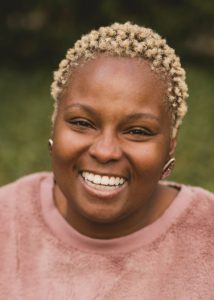
Keeonna Harris
Phoenix, Arizona
Keeonna Harris published her Fellowship project, “Desert Bloom: My wedding day, inside a California prison,” in Salon. The personal essay is an excerpt of Mainline Mama, a memoir of her experience as a Black mother co-parenting with an incarcerated father for almost twenty years. The book, which exposes the complexities of raising a family while living in the borderlands of the criminal justice system, was acquired by Amistad Books in 2021.
Through the Fellowship, Harris worked with poet and memoirist Randall Horton.
Post-Fellowship, Harris contributed to numerous anthologies: An essay to the Vera Institute of Justice’s Motion for Justice project; A chapter in a forthcoming Haymarket Press book (title TBD), an anthology of writers of color on abortion, pregnancy, birth, and loss of pregnancy; As well as a piece to (Super)Vision: On Motherhood and Surveillance by Sophie Hamacher, forthcoming in 2021. Harris was a debut resident at the 2020 Tin House Summer Residency.
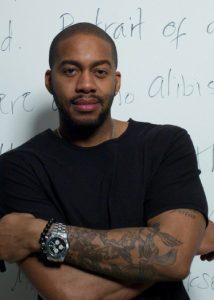
Mitchell S. Jackson
New York City, New York
Mitchell S. Jackson will work on Survival Files, a multimedia project of portrait photography and prose that exposes the often tenuous biographical distinctions between those working within, and those who’ve become wards of, the criminal justice system. A short story inspired by this project was published in The Washington Post.
Through the Fellowship, Jackson worked with photographer and multimedia creator Bayeté Ross Smith.
During the Fellowship, Jackson published Survival Math: Notes on an All-American Family (Scribner, 2019) to widespread acclaim—its prose described by Publishers Weekly as “a stunning mix of internal monologue and historical and religious references. . . shin[ing] an important light on the generational problems of America’s oft-forgotten urban communities”—in venues including The New York Times Book Review, USA Today, The Boston Globe, and TIME.
Post-Fellowship, This American Life adapted Jackson’s “Twelve Minutes and a Life,” from his longform profile on Ahmaud Abery, originally published in Runner’s World. Jackson has published articles in Harper’s Bazaar, Men’s Health, and holds a regular column in Esquire. In 2019, Jackson received a Cullman Center Fellowship, and a 2020 Creative Capital Award.
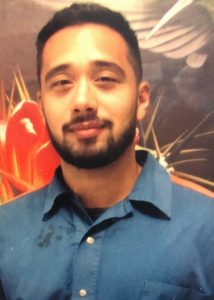
Justin Rovillos Monson
Freeland, Michigan
Justin Rovillos Monson worked on AMERICAN INMATE, a sequence of poems in the form of a literary mixtape that samples and remixes various sources, and explores the desires, pains, and experiences of being a young, Filipino-American man in prison. Poems from the collection have been published in The Nation, Michigan Quarterly Review, POETRY magazine, 433 Magazine, and Hayden’s Ferry Review.
Through the Fellowship, Monson worked with poet John Murillo.
Post-Fellowship, Justin participated, from prison, in a roundtable on poetry and prison abolition via The Poetry Project. Justin was interviewed on the POETRY magazine podcast, who said, “Justin Monson is one of the most courageous, original, daring poets working today. I first encountered his work three years ago, as a judge for PEN America’s Writing for Justice Fellowship, and was absolutely taken aback from the very first lines.”
In response to COVID-19, Justin was featured in PEN America’s Temperature Check: COVID-19 Behind Bars series, and subsequently on The PEN Pod with Writing For Justice Fellow Beth Shelburne, as well as in conversation with Caits Meissner through Eastern State Penitentiary’s Spotlight series.
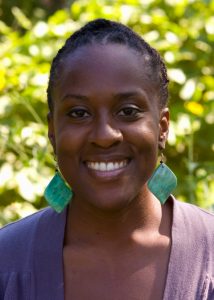
Priscilla Ocen
Los Angeles, California
Priscilla Ocen published “Awakening to a Mass-Supervision Crisis,” her fellowship-supported longform essay exploring the struggles of women on parole, in The Atlantic.Through this project, Priscilla contributed project research to serve as source material for a forthcoming PEN America-supported performance and advocacy collaboration written by Mahogany L. Browne.
Through the Fellowship, Ocen worked with ProPublica journalist Nina Martin.
Post-Fellowship, Priscilla received a Fulbright Scholarship for her project, “Exploring the Relationship between Imprisonment and Intimate Partner Violence in the Lives of Ugandan Women,” and through this opportunity, worked with women in Ugandan prisons.
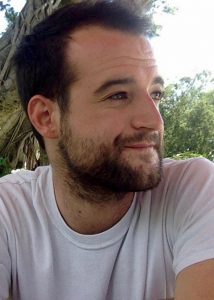
David Sanchez
Coral Gables, Florida
David Sanchez mined his personal experience to complete a novella-length work of fiction that follows an unnamed 20-year-old protagonist as he struggles with drug addiction, incarceration, joblessness, homelessness, and mental illness. The book, All Day Is A Long Time, was acquired by Houghton Mifflin Harcourt in 2020 and is slated for release in January 2022.
Through the Fellowship, Sanchez worked with novelist Justin Torres.
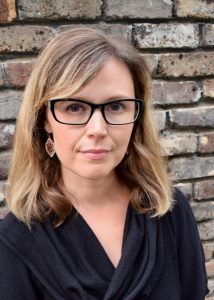
Beth Shelburne
Birmingham, Alabama
Beth Shelburne published The Castaways, a long-form narrative journalism piece about a group of aging men in Alabama who are serving life without parole for minor, nonviolent crimes committed as young adults, in The Daily Beast.
Through the Fellowship, Shelburne worked with Shaila Dewan, national criminal justice editor at The New York Times.
Post-Fellowship, Shelburne stepped into her role as investigative reporter with the Campaign For Smart Justice, a grant-funded arm of the ACLU.
Additionally, Shelburne published “Angola’s Angst, A Disquieting Tour Through the Largest Maximum Security Prison in The Nation,” an essay based on the Writing for Justice Fellowship’s trip to the Angola Louisiana State Penitentiary, in The Bitter Southerner. She has also published pieces in various news outlets, including The Appeal, the Los Angeles Times, and the Alabama Political Reporter, among others.
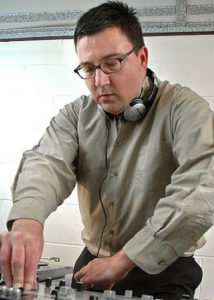
David Heska Wanbli Weiden
Highlands Ranch, Colorado
David Heska Wanbli Weiden is at work on a hybrid book, part memoir, reportage, and essay, that explores the Major Crimes Act’s direct contribution to the rise of Native American incarceration through the story of his cousin’s first-degree murder conviction, rehabilitation, and release home.
Through the Fellowship, Weiden worked with journalist and poet Eliza Griswold.
Post-Fellowship, Weiden published his novel Winter Counts (Ecco), which was called “an addictive and groundbreaking debut thriller set on a Native American reservation” by New York Times Book Review Editors’ Choice; has garnered high praise from outlets including The Washington Post, Publishers Weekly, USA Today, San Francisco Chronicle, Booklist, O, the Oprah Magazine, and named a best book of 2020 by Publishers Weekly, Library Journal, NPR, Amazon, Sun Sentinel, BOLO Books, Deadly Pleasures, CrimeReads, LitReactor, The Buzz Magazines, She Reads, Tribal College Journal, and Goodreads.
Additionally, Weiden published various creative nonfiction in, “Carlisle Longings,” in Shenandoah (longlisted for the 2018 PRISM International Creative Nonfiction Prize), The New York Times, The Strand Magazine, CrimeReads, and The Millions, among others.
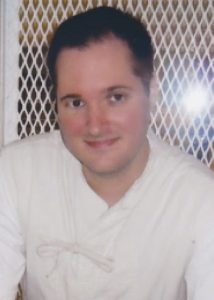
Thomas Bartlett Whitaker
Tennessee Colony, Texas
Thomas Bartlett Whitaker’s Dividing by Zero, a long-form article that describe his time living on the Deathwatch section of Texas’s death row, his successful clemency commutation by the governor mere minutes before his death, and the administrative limbo of his present life, is forthcoming in Guernica.
Through the Fellowship, Whitaker worked with Maurice Chammah, journalist and staff writer for The Marshall Project.
Post-Fellowship, Whitaker’s work has found homes in The Crime Report, and the anthology What We Know, published by The New Press and edited by Writing for Justice Fellow Vivian D. Nixon.
2018 Writing For Justice Finalists
Robert Chan
Ashley Dixon
Elizabeth Hawes
Faylita Hicks
Damaris Hill
Sabina Karit
Daliah Singer
Matthew Shaer
Eleanor Stanford
Robin Urevich
2018 Writing for Justice Semifinalists
Sandy Allen
Harriet Clark
Michael Conway
Kia Corthron
Maura Ewing
Victoria Ford
Benjamin Frandsen
Dana Greene
Kenneth Hartman
Edyson Julio
John J. Lennon
Arthur Longworth
Tina Peng
Shana Siegel
Philip Stockton

